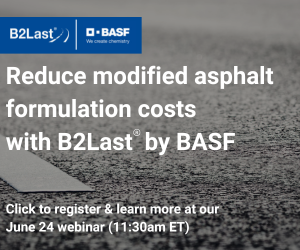The Asphalt Institute’s lab is available to perform research, testing and training.
Multiple Stress Creep Recovery Testing of Asphalt Binders
One of the lingering concerns about the Superpave Binder Specification (AASHTO M-320, Specification for Performance Graded Asphalt Binders) has been the applicability of the specification tests for modified asphalt binders. As a result, many user agencies have elected to place additional testing requirements on performance graded asphalt binders that should be considered modified asphalt binders. These “PG-Plus” tests include elastic recovery, force ductility and toughness and tenacity tests among others. Whichever PG-Plus test, or combination of tests, is specified by the user-agency, the purpose remains the same—to ensure that elastomeric modification (e.g., SB, SBS, SBR, etc.) is used to produce the particular asphalt binder grade that is specified. These tests require extra sample preparation and testing time and may require additional lab equipment.
Recently, a new test has been developed that could potentially eliminate many PG-Plus tests. The Multiple Stress Creep Recovery (MSCR) test can be conducted using the same sample and dynamic shear rheometer (DSR) equipment as the AASHTO M320 specification test. The MSCR test is performed using the DSR by applying a controlled shear stress of 100 Pa using a haversine load for 1 second followed by a 9-second rest period. During each cycle, the asphalt binder reaches a peak strain and then recovers before the shear stress is applied again. The difference between the peak strain and the final strain is divided by the peak strain to get the percentage of elastic recovery for each cycle. Ten creep-recovery cycles are used at 100 Pa shear stress and the average elastic recovery is determined. Immediately after ten cycles are completed at 100 Pa shear stress, the testing continues with an additional ten creep-recovery cycles using 3200 Pa shear stress.
Details of appropriate specification limits and test reproducibility are still being considered. One specification approach that has been considered involves two parts: (1) a minimum recovery percentage at the asphalt binder grade temperature using 3200 Pa shear stress; and (2) a minimum ratio of the recovery at 3200 Pa to the recovery at 100 Pa shear stress. In the first part, a minimum recovery percentage ensures a sufficient presence of elastic material in the asphalt binder at a high shear stress level. In the second part, a minimum ratio ensures that the asphalt binder is not highly stress-dependent.
For more information or to get a quote on performing the multiple stress creep recovery (MSCR) test for asphalt binders, please contact either Mike Anderson or Gary Irvine of the Asphalt Institute Lab.














